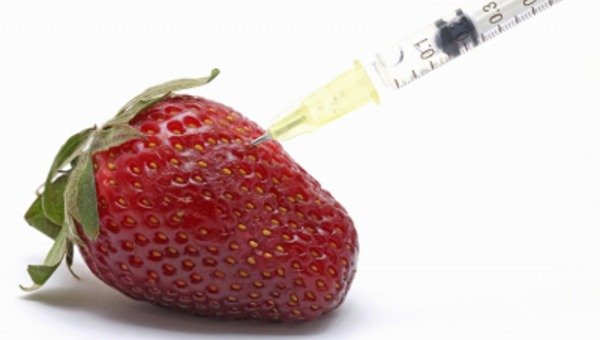Genetically modified foods (GMO, GE, or biotech foods) are foods produced from organisms that have had changes introduced into their DNA through methods of genetic engineering.
Mounting research published in peer-reviewed journals reveals a wide variety of health hazards associated with consuming genetically engineered foods and the chemicals that accompany these crops:
“Independent studies with animals showed stunted growth, impaired immune systems, bleeding stomachs, abnormal and potentially precancerous cell growth in the intestines, impaired blood cell development, misshaped cell structures in the liver, pancreas and testicles, altered gene expression and cell metabolism, liver and kidney lesions, partially atrophied livers, inflamed kidneys, less developed organs, reduced digestive enzymes, higher blood sugar, inflamed lung tissue, increased death rates and higher offspring mortality as well.
“Two dozen farmers reported their pigs and cows became sterile when fed GM corn and 71 shepherds said 25 percent of their sheep fed Bt cotton plants died. Other reports showed the same effects on cows, chickens, water buffaloes and horses. After GM soy was introduced in the UK, soy allergies skyrocketed by 50 percent. In the U.S. in the 1980s, a GM food supplement killed dozens and left 5-to 10-thousand others sick or disabled.
Why GMO Plants Are Dangerous to the Earth
Genetically engineered (GE) super weeds and super pests are spreading across U.S. farm fields. Almost 50 percent of American farmers are now battling Roundup resistant weeds in their corn and soy fields. To get rid of them, they’re forced to resorting to larger amounts of Roundup herbicide, Monsanto’s flagship chemical weed killer, and other even more toxic herbicides such as Agent Orange 2,4-D or Dicamba. Looking at the statistics over the last decade, there are actually more herbicides than ever being used. As a result, the industry’s promise that GE crops would allow for fewer pesticides has failed.
The original rationale for using GE crops was that they could be sprayed with less toxic herbicides, such as Roundup—was purported to be harmless and biodegradable. However, mounting research reveals that Roundup may be one of the most toxic chemicals ever to enter our food supply. Some scientists, like Dr. Don Huber, believe it may be even more toxic than DDT.
“GMO Bt seeds are soaked in toxic fungicides called neonicotinoids, which have been linked to the mass die-off of bees in the US and around the world. This threatens about 70 percent of the US food supply (fruits, vegetables, berries and nuts that rely on bees for pollination), Their rapid demise has gained worldwide attention.
• The environmental impact of GE crops and associated agricultural chemicals, like Roundup shows how they destroy soil microbes and inhibit the fertility of the soil.2
5 Steps You Can Take to Avoid GMO Foods
1. Assume all non-organic corn, soy, cottonseed, sugar (from sugar beets) and canola (rapeseed) ingredients are GMO since they are the largest GMO crops in North America. Also if it says vegetable oil or oil blend, it’s very likely canola oil. Avoid all processed food since it is likely to contain one or more of these ingredients.
2. Avoid artificial sweeteners. Aspartame is made with bacterial strains of genetically modified strains of E. coli. In addition, aspartame causes a host of negative side effects.
3. Be aware of hidden ingredients. Ingredient lists are often difficult to read or understand. Some of the ingredients are derived from genetically modified organisms (GMOs). A few of the more common products include: xanthan gum, glutamate, hydrolyzed vegetable protein, lactic acid, cellulose, citric acid, maltodextrin, and mono and diglycerides.
4. Buy only certified organic dairy products or those that are rBGH-free. Conventional dairy products are often made from the milk of cows raised with rBGH, a growth hormone likely to contain genetically modified components.
5. Don’t trust PLU codes on fruits and vegetables. Though the 5-digit code beginning with an 8 identifies a GMO food, such identification is optional and apparently produce providers have chosen not to be so forthcoming. The one you can trust is the 5-digit code starting with 9, which identifies organic fruits and vegetables.
Cherie Calbom, MS, CN, is the author of 21 books, including The Juice Lady’s Big Book of Juices and Green Smoothies and Juicing, Fasting, and Detoxing for Life. She holds a Master of Science degree in whole foods nutrition from Bastyr University. Cherie and her husband Fr. John offer juice fast-raw foods retreats throughout the year along with health and healing conferences. For more information, see www.juiceladycherie.com















































